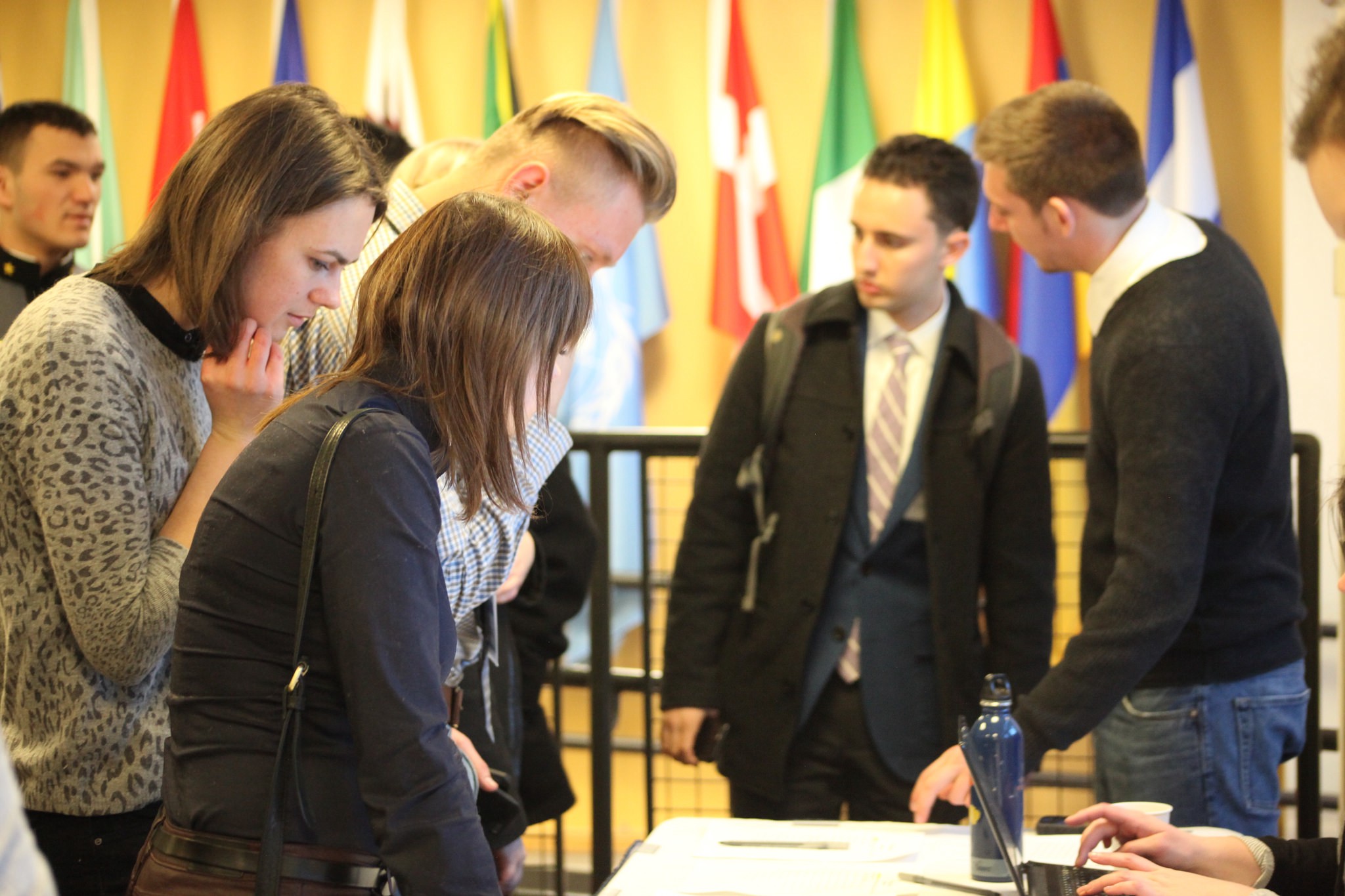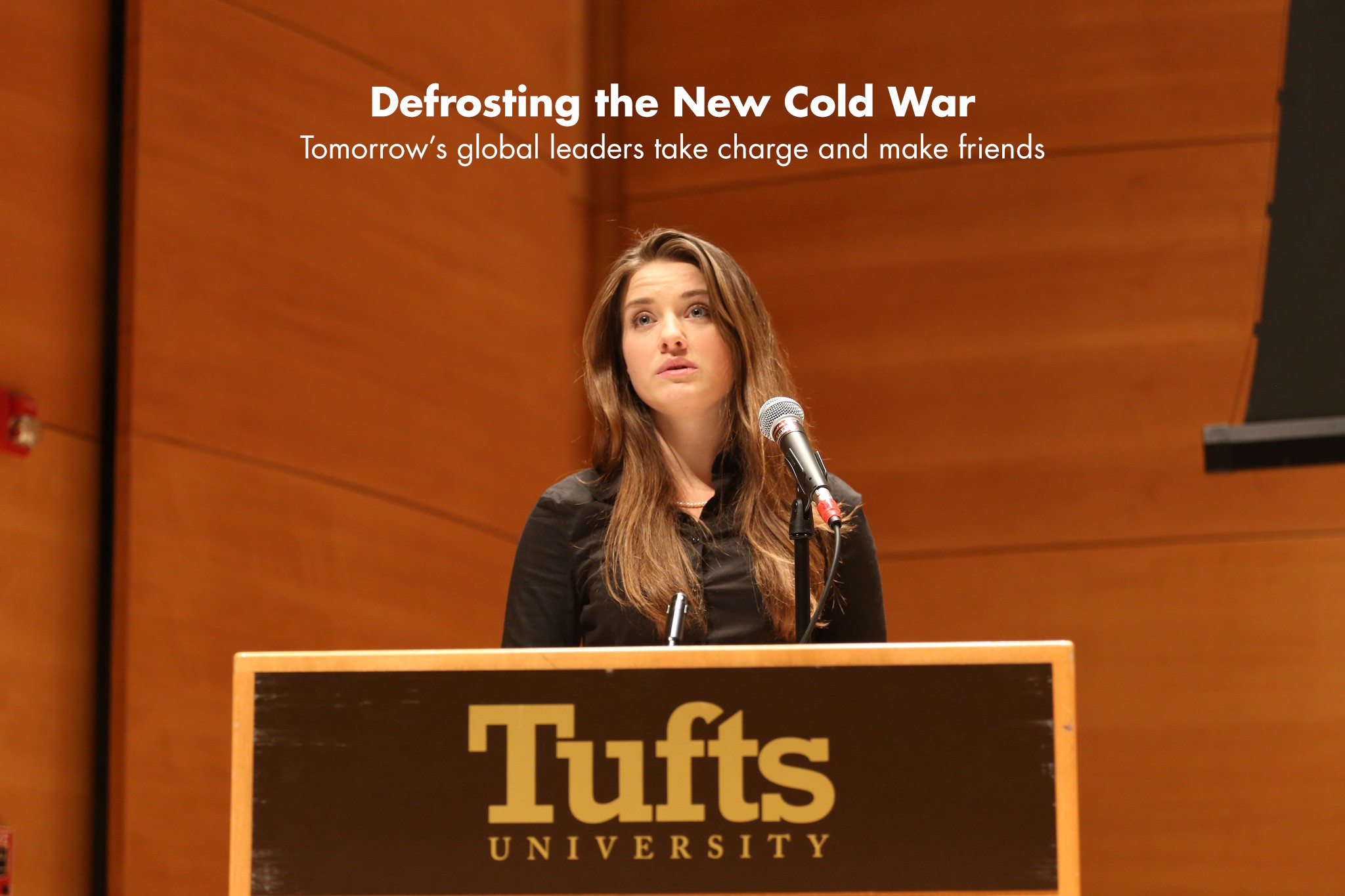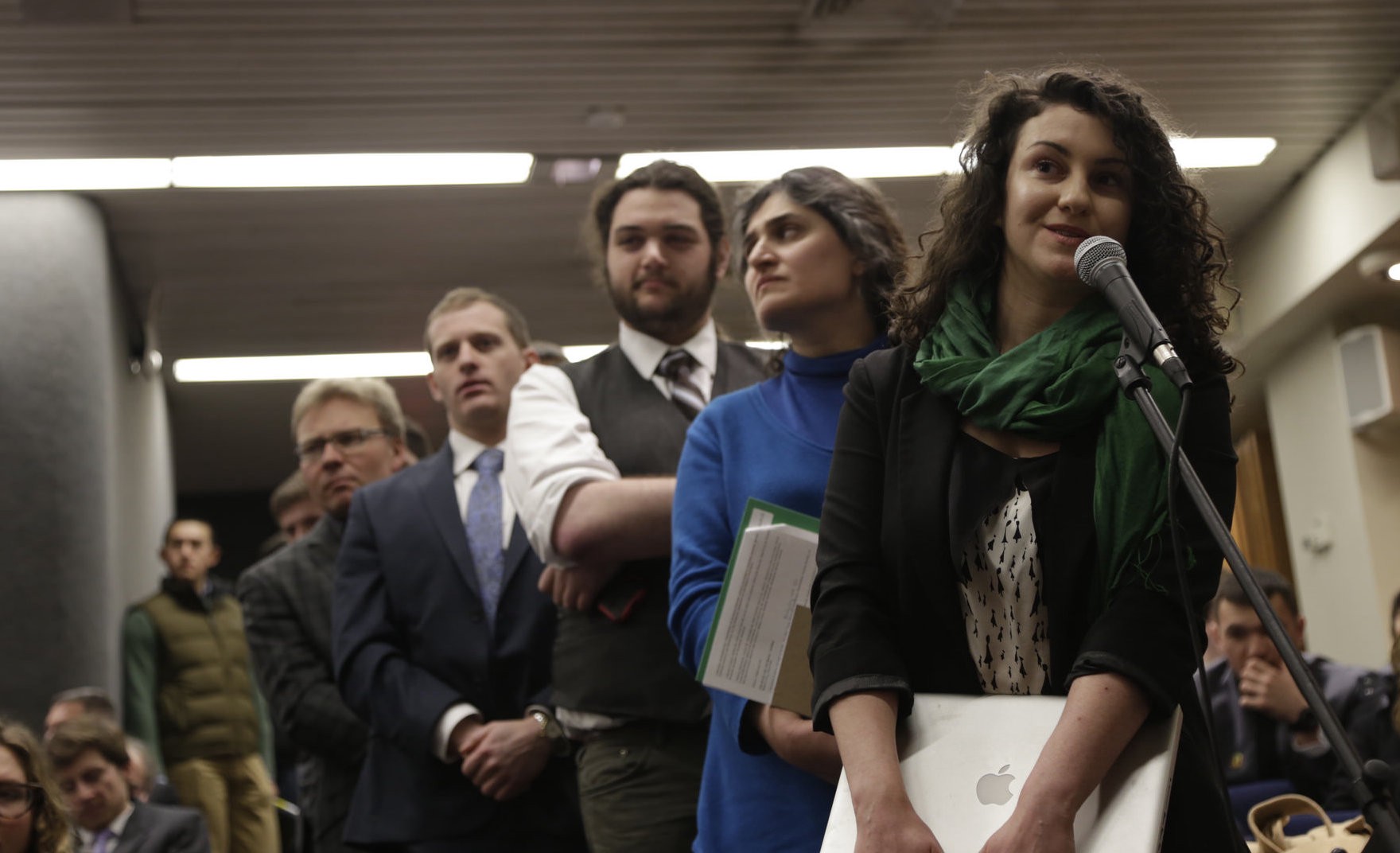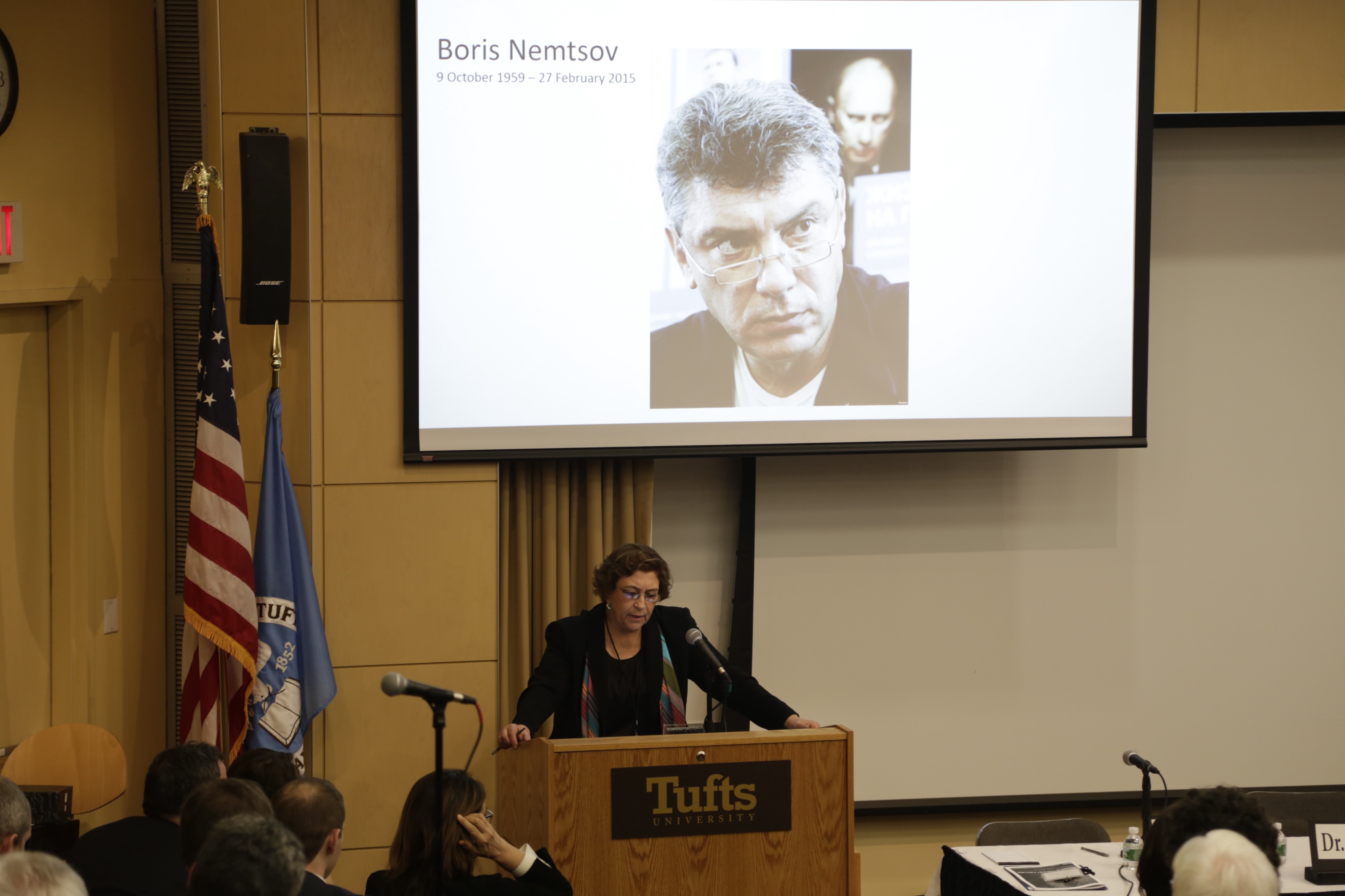Defrosting the New Cold War
Tomorrow's global leaders take charge and make friends
Tomorrow's global leaders take charge and make friends

New hope for the future…possibilities for growth…mutually respected interests…build networks…never assume there’s only one side. These phrases come easily to the international relations students from the Institute for Global Leadership (IGL) at Tufts University, a unique program that trains undergrads for a role on the global stage. Carnegie Corporation of New York is a supporter of IGL and its work prepping the next generation of foreign policy leaders.
Every year, IGL undergraduates in the EPIIC (Education for Public Inquiry and International Citizenship) program organize a symposium where international practitioners, activists, academics, public intellectuals, and journalists give presentations and participate in panel discussions, informal gatherings, and workshops. EPIIC students play prominent roles as the event’s presenters and moderators.

The experts’ perspectives are intentionally diverse, often competing, and at times adversarial. The theme for 2015 was Russia in the 21st Century, and the topics included the Challenges of Corruption; Cyber Conflict and Cooperation; the State and the Media; Religion, Politics and Identity; the Russian Economy; and several sessions on governance and U.S.-Russia relations. The atmosphere was charged as students and Russia experts alike debated the United States’ decision on whether to arm Ukrainian forces, if the shaky cease-fire would take hold, and what Putin might be planning next, among other provocative subjects.
The official welcome was scheduled for Friday evening, February 27th, with the presentation of a Dr. Jean Mayer Global Citizenship Award to Kirill Koroteev, senior lawyer of Moscow-based Memorial, the Human Rights Centre, currently under attack in the Russian courts.
But before the first speech could be delivered, word came that Boris Nemtsov — Russian scientist and prominent opposition leader — had been shot dead in view of Red Square. A tragic personal loss to some at the gathering, and a shock to all, Nemtsov’s murder served to underscore the high stakes of the issues on the agenda.
“Very recently, Russia was considered by many a diminished nation, an international backwater with a dwindling population; the Wild East, a gangster nation,” wrote Sherman Teichman, Founding Director of the IGL and the force behind all things EPIIC, setting the stage for the proceedings.
“Others saw an example of predatory and inefficient capitalism, a raw materials mono-economy riven by intense ethnic divisions. With the U.S. pivoting toward Asia, Russia was deemed almost irrelevant.
“Exactly one year before the opening of the first EPIIC Russia symposium, pro-Russian forces swiftly began to occupy strategic positions and infrastructure across the Crimean peninsula, and the Kremlin ordered major military exercises. As we convene, Russia is again front and center, causing many to question if we are in a dangerous, unstable ‘New Cold War.’
“There is now a deep distrust of Russia’s aims and actions. And some might argue there is a reason for Russia’s deep reciprocal distrust of Western intentions. Clearly, we have a responsibility to probe Russia in the 21st century in its many complex dimensions.”



What were they thinking?
We polled a few of the EPIIC student organizers to get their assessment of U.S.-Russia relations and learn how their views might have been shaped by this event and a year of intense international study. We started by asking about a New Cold War.
Ethan Krauss
Junior
Anchorage Alaska
—Do you think the U.S. and Russia are heading into a new cold war?
No.
—What would you do if you were a U.S. policymaker?
I would try to create interpersonal connections with my counterparts in the Russian Federation who at some point, if not now, will be in charge of policy, so that we have established networks to work through in the future.
—How has your EPIIC experience affected your view of Russia?
I see a lot of possibilities for growth in the future of US-Russia relations because I think there is a new generation of diplomats who can interact on a personal level and who understand that neither state is always right in its policies…but I’m disheartened by the challenges to our relationship and arising in Russia.
Benya Kraus
Freshman
Bangkok, Thailand
—Do you think the U.S. and Russia are heading into a new cold war?
I don’t think it’s inevitable. There are several solutions we can and should take. Not zero sum solutions; we’re going to have to re-teach ourselves the meaning of compromise. …We have to make sure we’re abiding by the standards we impose on everyone else.
—What do most Americans misunderstand about Russia?
There’s still that Soviet- era stigma on Russia. I think we’re looking at Russians in the wrong historical lens. … We’re not seeing Russia as important an issue as it should be — a global player that we need to be working with.
—How has your EPIIC experience affected you?
Before entering university I made a list of all the things I knew I did not know, and Russia was at the top of that list. When I saw there was a class dedicated to a year-long study of Russia, I said ‘this is it!’ The learning curve was massive. Now there are more things I know I don’t know about Russia than I did in the beginning.


Vladimir Poluektov
Second Year Masters Student
Moscow, Russia
Moscow State Institute of International Relations (MGIMO)
—Do you think the U.S. and Russia are heading into a new cold war?
I think it’s not completely the new cold war, but tough tension between our two countries. All parties have their own interests and there are differences in our approaches to the world and to solving various international issues. But as for the cold war, I’d not say that because cooperation still exists, and we’re still working together.
—What do most Americans misunderstand about Russia?
Thinking that we are the most evil guys on the surface of the earth. One of the misconceptions is about “Putin’s evil strategy,” as someone has written. But we are the nation that really wants peace and we are promoting this idea of mutually respected interests.
—How has your EPIIC experience affected your views?
I’ve made a lot of friends this year and last year. At the symposium you can share your views from various perspectives, and talk to different people about their interests — open discussions with no emotions, no personal stuff, we’re just talking business — that’s the great thing.
Shelby Luce
Sophomore
Carmel, CA
—Do you think the U.S. and Russia are heading into a new cold war?
I’m definitely torn. The idea of a new Cold War is just ridiculous to me, but if we keep going in the same direction we will be in one.
—Is there any reason for optimism about US-Russia relations?
As of right now, the optimism I feel isn’t coming from the government sphere, but from people my age realizing we can work together with Russians. The Internet is such an interesting sphere now for Russians and for people in the U.S. because it gives people our age a chance to connect and build relationships in a way that isn’t driven as much by Western media messages.
—How has your EPIIC experience affected your views?
I come from a point of knowing nothing about Russia. My major is community health and environmental science… But because I came in with no knowledge of Russia, I’ve learned how powerful this EPIIC program is. This program has given me new hope for the future. It’s something I want to teach my friends who aren’t in this program more about.
Ben Spevack
Senior
Mattapoisett, MA
—Do you think the U.S. and Russia are heading into a new cold war?
I think to call it a cold war conjures up a lot of historical memories that aren’t exactly appropriate for the current situation; you think about these classes of ideologies, communism versus democracy… I wouldn’t use the words new Cold War, but there are a lot of similarities.
—If you ran the State Department, what would you do to correct the course?
I was talking with a few of the EPIIC students about what would be the right thing to do, and one of the Russian students made a great suggestion, especially in the context of the Ukrainian conflict: to get a neutral third-party either as observers or full-on peacekeepers, from somewhere like India or Argentina, that has amicable relations with both sides, to be the mediators on the ground. I think there are a lot of shared interests where productivity is being squandered. Things like counterterrorism, ISIS for example, those are things where there’s no debate that we all have to do something. We don’t have to agree on everything, but we can still cooperate on those spheres.
—How has your EPIIC experience affected your views?
It has definitely reminded me to look critically at issues and never to assume that there’s only one side; there are always multiple sides, and you can’t tackle an issue unless you can examine it from all sides.
Grigory Khakimov
Junior
Kaluga, Russia
—Do you think the U.S. and Russia are heading into a new cold war?
We cannot describe this stage in our relationship as a cold war because in a cold war we have two different ideologies: socialism and capitalism. Russia has integrated the capitalist system, with Russian authorities, who compare themselves to the corporate elite, representing the Russian corporation in the global market.
—What is the U.S. doing wrong in its dealings with Russia?
I’m not sure about the sanctions. Russia is a very rich country. This is not just about the economy or financial institutions, this about resources and potential resources that Russia has. Sanctions therefor have a temporary influence on the Russian economy and political system, but they won’t produce lasting change. Putin’s rating in Russia is now 85% positive, despite the fact that there is near collapse of financial institutions.
—How has your EPIIC experience affected your world view?
In Russia I was exposed to a lot of propaganda and conspiracy theories about unfriendly Americans who just wanted to destroy the Russian regime, Russian order; that they hate Russian people, Russian government. When I came here I saw a lot of different views. EPIIC gives me an important opportunity to see this kind of new connections — cultural and intellectual — that we can build between our countries.
Read more at Carnegie Forum: Rebuilding U.S.-Russia Relations